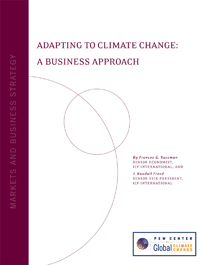Businesses Should Consider Climate Risks: Report
 Washington, D.C., USA – A drought in southern Queensland, Australia, got the upper brass of Rio Tinto wondering about climate change.
Washington, D.C., USA – A drought in southern Queensland, Australia, got the upper brass of Rio Tinto wondering about climate change.The drought had forced a local power plant to lower its output, which in turn lowered Rio Tinto’s sales because the mining company supplied coal to the power plant.
Rio Tinto began to calculate how climate change would affect regions in which it operated mines. Rio Tinto’s preparation for future climate impacts led it to become one of three businesses highlighted in a Pew Center Report released Wednesday that delves into how businesses can adapt to the physical effects of climate change.
“We know climate change is occurring and the real world ramifications of that change are already being felt,” said Eileen Claussen, president of the Pew Center on Global Climate Change. “In addition to policies that reduce greenhouse gas emissions, we also need strategies to adapt to those climate change impacts that are unavoidable. The private sector faces a range of risks and it is important that they begin now to assess their options and strategies for adapting.”
According to the report, the most critical first step in evaluating climate impacts is understanding its potential risks and realizing the importance of trying to reduce them. The level of risk often depends on the sector but all companies must grapple with the potential of interruption, property damage and gaps in basic services.
Yet few businesses have created contingency plans. Aside from Rio Tinto, the report highlights steps taken by New Orleans-based Entergy and Travelers Insurance.
You can return to the main Market News page, or press the Back button on your browser.

